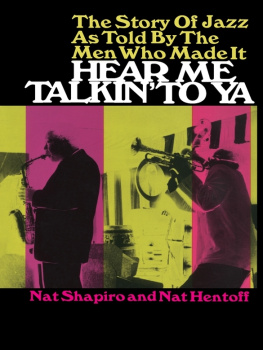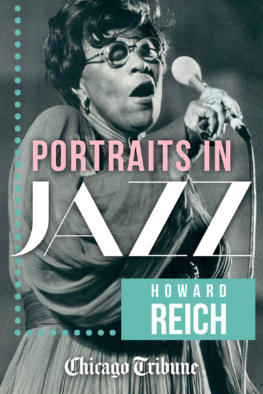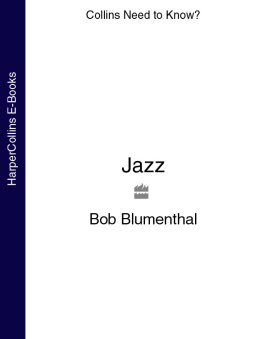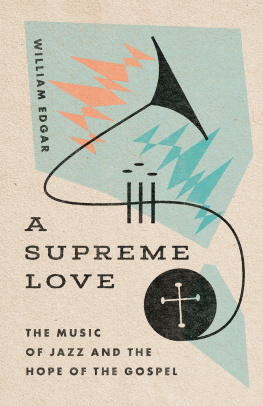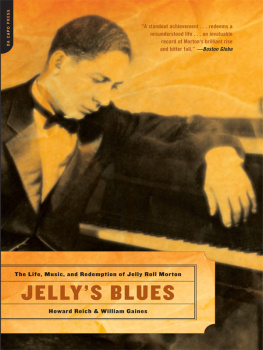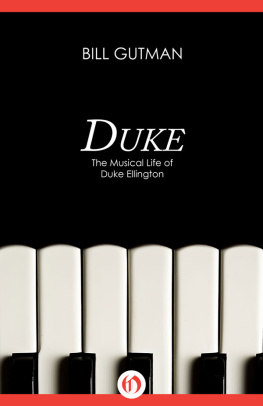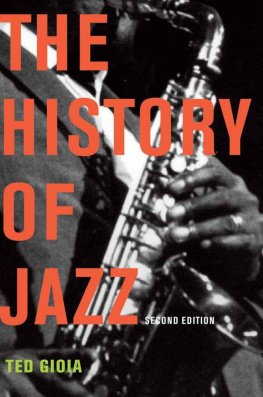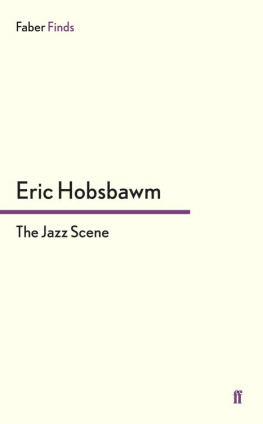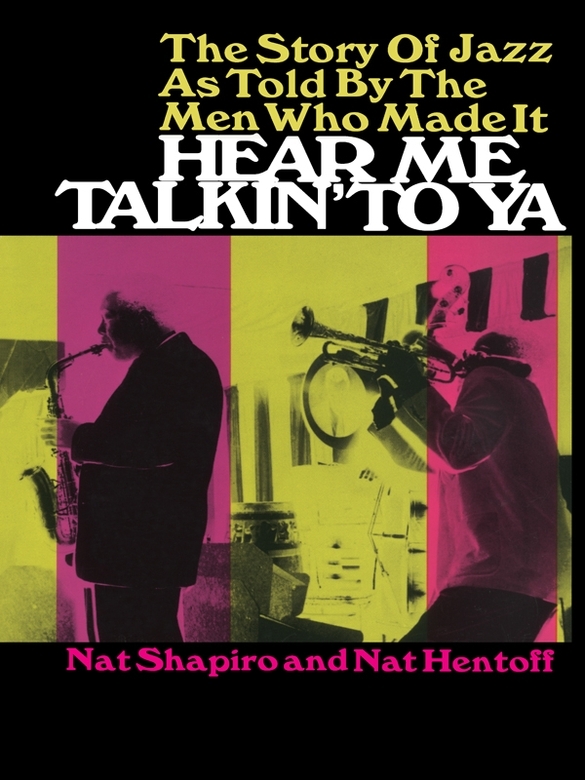Acknowledgments
For arrangements made with various publishers, magazines, organizations and individuals whereby certain copyrighted material was permitted to be reprinted, and for the courtesy extended by them, the following acknowledgments are gratefully made:
Doubleday & Company , Inc. for an excerpt from His Eye Is on the Sparrow by Ethel Waters and Charles Samuels. Copyright 1950, 1951 by Ethel Waters and Charles Samuels, reprinted by permission of Doubleday & Company, Inc.
Down Beat for articles or portions of articles by or about, and portions of interviews with, the following: Wingy Manone, Nat Towles, Bunk Johnson, George Baquet, Louis Armstrong, Jack Weber, Preston Jackson, Lil Armstrong, George Wettling, Tony Catalano, Paul Mares, Ben Pollack, Wayne H. Rohlf, George Johnson, Jimmy McPartland, Frank Trumbauer, Russ Morgan, Jelly Roll Morton, Joe Oliver, Cuba Austin, Billie Holiday, Fletcher Henderson, John Hammond, Irving Mills, Ned E. Williams, Billy Strayhorn, T-Bone Walker, W. C. Handy, Maurice Waller, Joe Venuti, Red Nichols, Miff Mole, Count Basie, Lester Young, Gene Krupa, Artie Shaw, Roy Eldridge, Lena Horne, Charlie Parker, Stan Getz, Anita ODay, Stan Kenton, Dave Brubeck, Woody Herman, Paul Desmond, Andre Previn. The material is reprinted by special permission of Down Beat, Inc. and Norman Weiser. Copyright 1938, 1939, 1940, 1941, 1942, 1943, 1944, 1945, 1946, 1947, 1948, 1949, 1950, 1951, 1952, 1953, 1954.
Duell, Sloan & Pearce, Inc. for excerpts from Mr. Jelly Roll by Alan Lomax, by permission of Duell, Sloan & Pearce, Inc.
Ebony for permission to use an excerpt from an article entitled How Gangsters Run the Band Business by Earl Hines which appeared in Ebony magazine.
Esquire for excerpts from articles by Louis Armstrong, Count Basie, and Rex Stewart which originally appeared in the Esquire 1947 Jazz Book.
Farrar, Straus & Giroux, Inc. for permission to use an excerpt from The Trouble with Cinderella by Artie Shaw, published bv Farrar, Straus & Giroux, Inc. Copyright 1952.
Fawcett Publications for excerpts from an article by Louis Armstrong which appeared in True, The Mans Magazine, November 1947.
Jazz its editor, Bob Thiele, and Frederic Ramsey, Jr., for excerpts from Chicago Documentary by Frederic Ramsey, Jr. which first appeared in Jazz magazine.
Jazz journal and to Sinclair Traill for permission to use excerpts from articles appearing in Jazz Journal by John Provenzano, (May 1950); Armand Hug, (December 1950); Cecil and Lloyd Scott, (January 1954); Mezz Mezzrow, (May 1953); Count Basie, (May 1950); and Fats Waller, (May 1952).
Jazz Music and to Max Jones for permission to use excerpts from articles appearing in Jazz Music about Mutt Carey and Albert Nicholas.
Jazz Record and its editor Art Hodes for permission to use excerpts from articles that appeared in Jazz Record magazine by or about Carl Van Vechten and Muggsy Spanier.
Le Jazz Hot and Charles Delauney for permission to use excerpts from articles that appeared in Le Jazz Hot by Preston Jackson, Tommy Brookins, and Kaiser Marshall.
Melody Maker the weekly music newspaper published in London, England, and its editors, for permission to reprint excerpts from articles by and interviews with Ralph Berton, Jimmy McPartland, Joe Turner, Mary Lou Williams, Billie Holiday, Billy Ternent, W. T. Ed Kirkeby, Billy Eckstine, and Mary Ann McCall.
Metronome for permission to use directly quoted material from interviews that appeared in Metronome, with Rex Stewart, Gene Krupa and Teddy Hill.
New Orleans Jazz Club for permission to use excerpts from the feature, Libretto, appearing in its publication, The Second Line ; April 1951 and January 1951.
Random House for permission to use excerpts from Really the Blues by Mezz Mezzrow and Bernard Wolfe. Reprinted by permission of Random House, Inc. Copyright 1946 by Random House, Inc.
RCA Victor Records for permission to use excerpts from the notes written by W. T. Ed Kirkeby for the RCA Victor Album, Fats (LPT6001).
The Record Changer and its editors, Bill Grauer and Orrin Keepnews, for their cooperation and for permission to reprint excerpts from articles appearing in The Record Changer by or about Kid Ory, Bud Scott, Sidney Bechet, Ed Allen, Baby Dodds, Louis Armstrong, and Cuba Austin.
Hoagy Carmichael for permission to reprint material from The Stardust Road. Copyright 1946 by Hoagland Carmichael.
The Stackpole Company for permission to use an excerpt from The Kingdom of Swing by Benny Goodman and Irving Kolodin, published by Stackpole Sons, 1939.
Duke Ellington and his publicity representative, Joe Morgan, for permission to use excerpts from a series of articles by Duke Ellington that appeared in Swing magazine, 1940.
Leonard Feather for information from his Encyclopedia of Jazz, which was graciously made available to the editors prior to the publication of Mr. Feathers invaluable work.
Coda
CHARLIE PARKER
Music is your own experience, your thoughts, your wisdom. If you dont live it, it wont come out of your horn.
They teach you theres a boundary line to music. But, man, theres no boundary line to art.
MILT HINTON
What is jazz? What makes a great jazzman is experience. Unless youve had experience and lived, what could you have to say on your instrument except copy off records? A person has to have lived to play great jazz or else hell be a copy. Its like the story of the young guy who was copying this fine modern jazzman. He copied him note for note, phrase for phrase. One night he went down to hear his idol at Birdland. And this copier was real high. Well, the man he had copied all this time wasnt up to par that night. So the copier went right up to him on the stand and said, Man, you aint you, Im you!
WOODY HERMAN
In every era weve had swing, boogie-woogie, et cetera, and each of these caused the same tumult thats going on now. Fortunately, it will all blow over, but the music will stay.
JO JONES
What is jazz? The closest thing I can get to saying what jazz is, is when you play what you feel. All jazz musicians express themselves through their instruments and they express the types of persons they are, the experiences theyve had during the day, during the night before, during their lives. There is no way they can subterfuge their feelings. It is like some kind of guy will say with a great big smile, Man, I dig you the most, and hell start playing something that sounds entirely different. Thats the same reaction an audience has sometimes. They may never have heard a man play before, and yet, when he brings his experiences onto the bandstand, he projects his feelings amongst the audience and he can either have them going out of the place smiling or in frowns. And that can prove disastrous after they get home. Because music, being such a medium as it is, can affect you all your life. Music is not only a God-given talent, it is a God-given privilege to play music. There shouldnt be any debauchery attached to it, and it should be presented in the exact spiritual vein originally intended. It is something within ourselves. Thats why various musicians express themselves so individually with various instruments.
PEE WEE RUSSELL
Whats jazz? Its kind of tough to get into words. You could use ten-syllable words and it wouldnt mean a thing. If I say something in the way of a definition Id probably retract it a second later. Im not sure that this will do it but in a way it sums down to thisa certain group of guysI dont care where they come from that have a heart feeling and a rhythm in their systems that you couldnt budge, a rhythm you couldnt take away from them even if they were in a symphony organization. Regardless of what type of music they decided to play, they could feel a beat from the conductor. They could feel the beat better than someone who has memorized the book. These are men whose way of playing you couldnt alter no matter where you put them or what you tried to teach them.

